Fair warning; if you have not seen the film or read the book, you may wish to leave now because I will spoilify you.
The new adaptation of Stephen King’s classic 1986 novel IT is likely to be the highest grossing film adaptation of King’s work to date. Directed by Argentine film director Andy Muschietti, who is best known for the 2013 horror flick ‘Mama’, the film has been divided into two parts. The child’s perspective and the adult’s.
Anyone who has read the original novel will recognise this as an unusual choice because the two are very much woven together in the book. So much so that you’d be forgiven for questioning whether the structural integrity of the narrative didn’t come crashing down when the film makers’ chose to divide those two strands. It didn’t fall apart, however, at the same time, it betrayed one of the most important underlying themes of the book.
IT is a book with many themes and all are worthy of exploration but perhaps the most fundamental of these is the classic Good vs Evil battle showcasing the weak defeating the all powerful. From that perspective, I’m not surprised there have been rave reviews. Speculative Fiction went through a recent boom in GrimDark fantasy and sci-fi, as jaded generation X-ers and Millennials grappled with the far from perfect reality the Baby Boomer generation have left them. And then of course we have current politics, which surely I don’t need to go into in detail for the intelligent reader to be able to draw parallels as to why a straight forward Good vs Evil fight might be both refreshing and desirable. In a way – in my opinion, in a very shallow way – the film does deliver that. But overall the film just didn’t work for me so here are my five reasons why.
One: The Great Divide.
Everyone remember being a child? The sheer scope and possibility of life? Okay so magic probably wasn’t real and aliens probably wouldn’t land a flying saucer in your back garden but it was possible. As children, ‘impossible’ and even ‘implausible’ are not fully fixed concepts. This is important because we are at the stage of increasing our store of knowledge about how the world and social interactions work. The frameworks on which we hang our trial and error juvenile hypotheses need to be correspondingly flexible. As adults our definition of what is possible becomes far narrower out of necessity. There are many folktales which deal with the base concept that you do not fully become an adult until you have learned to master fear. There’s some truth in that. If as adults we went through life with the same sense of possibility as children, we would never have mastered fear enough to function. I am conflicted about shutting parts of ourselves down in order to achieve this mastery but I don’t think anyone has achieved a better method yet. (If you have then please message me.) The point is that adults are often utterly incomprehensible to children. And if the adults in question have not retained at least a little of their child selves – and many do not – children are an equal mystery.
The adults in IT have learned not to see what’s going on in Derry. Despite the fact that the evil killer clown/ manatou/ shapeshifter/ space arachnid comes back roughly every twenty seven years – so at least once in every generation – they have learned to cite ‘adult’ reasons for the terrible things that happen in Derry, ‘adult’ logic for any hint of the inexplicable. They have taught themselves to forget. Some of that might be down to Pennywise (Mr Bob Grey) himself (or really that should be herself because *spoiler alert* IT is female) who has the power to get inside your head and make use of what IT finds there. IT is the ultimate gaslighter, no question. IT is also the ultimate predator. All of Derry is IT’s hunting ground, or rather it’s farrowing crate. In the book there’s strong hints that IT encourages the growth and success of the town, keeping it from prying eyes who might register that these twenty seven year cyclical killing sprees are happening, that the rates of murder and violence go well beyond what might be expected of another town of comparable size.
The children, on the other hand, with their natural credulity, can see what is really happening. There is a monster in the dark sewers and it preys on children. Or rather, it preys on fear, violence and most especially the unbounded creative force of a child’s imagination. (Hold that thought – that creative stuff is important.)
And this is the problem with dividing the child from the adult perspective in the films. Those two perspectives are stronger in the book for being presented simultaneously, even if each perspective is utterly alien and incomprehensible to the other. So strike one for me was sucking all the power out of the child-adult gulf of understanding.
Two: The Losers Club
I was an oddball child. I was weird. I didn’t fit in. And both adults and other children were uncomfortable around me – in fairness I was no more comfortable around them. Play time at primary school, for several years, was rather like that scene in Jurassic World where Chris Pratt’s character realises that the Veloceraptors are responding to a new alpha and it ain’t him. Those were my choices at school – being alone or being literally thrown like a basketball between a group of much older and larger kids. Before anyone gets out their violin, let me state this is not a sympathy play. I am laughing as I write this (I always do try to enjoy the last laugh) and my experience is not unique. Everyone gets bullied at school. Everyone. The only degrees of difference are severity and by whom. This is why stories about rag tag groups of morally aligned misfits saving the day despite the unlikeliness are so enduring. I mean, think about what your favourite fantasy films were when you were a kid. Did anything speak to you the way Star Wars spoke to me? My guess is yes. And for good reason. A group of ‘goodies’ band together and defeat the ‘baddies’. The weak overcame the strong despite seemingly insurmountable odds. This is why the Lord of the Rings, Star Wars, The Last Unicorn, Krull, Labyrinth and everything ever produced by studio Ghibli captures imaginations. Star Wars is the answer to the silent, internal cry of every bullied child everywhere.
In IT the seven who make up the Losers Club are all misfits from different backgrounds. Stanley Uris is Jewish and unlike many eleven year old boys, likes to stay neat and tidy. Eddie Kaspbrak is very small for his age and appears to have crippling asthma. Richie Tozier is too clever for his own good, wears thick lensed glasses and cannot keep his mouth shut. (I actually really feel for Richie because that was always my problem too.) Ben Hanscombe is fat. No really in most schools and times in the West that would be enough to have your life made a living hell. To cap it off though, Ben is liked by teachers because he likes school, works hard and is polite. That’s like having a target painted on you in neon. Bill Denborough stutters. Mike Hanlon is black – the only black child in Derry at the time the book is set. (Ok so the film sets it in 1989 not 1959 but there was still enough endemic racism for this to be a reason bullies would go after you.) Beverley Marsh is poor – which in America certainly and in other parts of the world definitely, is tantamount to being criminal. It’s certainly shameful. And Beverley is beautiful, which carries its own special shit stew of bullying tactics if you don’t have the wealth and status that are supposed to go with good looks.
But what’s remarkable about the seven children is less what sets them apart as outsiders and more what draws them together in a group. Each one of them has a sense of right and wrong independent of their at best neglectful or at worst downright abusive parents. Each of them has kindness and courage beyond the usual for most people. All of them are incredibly imaginative, creative individuals. And, importantly, all of them escape a lone encounter with IT before they form a group.
And that’s what bugs me about the new film. In some ways it was good to see the losers club reformed with new youngsters since the hit and miss 1990 TV mini series aired. However the film made it look like a matter of chance that each of the seven escaped IT whilst alone, removing agency from the characters.
In the book for example, Stanley Uris is lured up to the Standpipe where he is trapped in the tower with IT. The creature is posing as the dead children who drowned in the Standpipe. Stan survives by holding out his bird book (he is a budding ornithologist) and shouting the names of different species of bird at IT. Mike Hanlon uses ingenuity and a blood minded desire to die fighting to escape Rodan, the shape IT uses to attack him. Bill Denborough’s love for his brother overcomes his fear. Beverley outsmarts her father (Al Marsh is a favourite puppet of IT because he is brittle and wed to his own narrow world view) and escapes what might have turned into being beaten to death, she uses her grit to survive. Eddie Kaspbrak flees from the ‘leper’ at the house on Neibolt street, overcoming a lifetime of conditioning by his mother which says he is physically weak and cannot run. Richie thinks he hasn’t had an encounter with it when in fact he was attacked by the Paul Bunyon statue, he gets away and outsmarts town bully Henry Bowers and co – he uses his brain. Ben Hanscombe escapes the Mummy on the Kendeskeig river by choosing to embrace unlogic – logically the Mummy cannot be there. By trusting himself and choosing to believe it is there he escapes. All seven use something within themselves to get away. The film shows them saved at the last minute by luck or interruption and in my opinion this takes away from the characters.
Another factor in regard to the film version is that it just doesn’t capture the depth of love and friendship between the seven children. At a critical moment the group fractures and we’re treated to a montage of them all getting on with their own lives. This just doesn’t happen in the book. I appreciate that King is incredibly difficult to translate to screen because his themes scratch areas that other horror writers just don’t reach. That said, introducing conflict of that kind within the group detracted from the conflict outside of it. You could argue by the time Eddie breaks his arm in the book that the seven children are no longer entirely just children but are being used by something else, just as IT uses people in the town. They are very close to being ‘other directed’. However it is always clear that choice is an important factor. Which brings me on to:
Three: The Parents and other Adults.
The adults in IT are a very mixed bag and most are ineffectual at best.
Bill Denborough’s parents are so consumed with grief for the death of his six-year-old brother, George, they have forgotten they have a living son. Eddie Kaspbrak’s mother genuinely loves him, to the point where she will gaslight him into believing he has a serious, debilitating and chronic illness. It’s basically Munchausen via proxy syndrome and how she loves it when he needs to be cared for.
Stanley Uris’ parents are actually alright, we don’t hear much about them but they appear to fall into the ‘average’ category.
Ben Hanscombe’s mother is a good mother but suffers from not really having much in the way of skills except the desire to work. She’s tough and has kept them both fed and sheltered after being widowed early, but part of that love for Ben has been translated in over feeding him. She works such long hours as well that she often doesn’t know what’s going on in his life. Her lack of vigilance isn’t deliberate neglect, but it’s the sort of thing that a non supernatural predator who preys on children looks for in a victim.
Richie Tozier has genuinely good parents. He is not what his mother wanted, frankly she doesn’t understand him and is a little spooked by the way his mind works (another reason for me to identify with Richie) but her love and care is undisputed. As is his father’s. His father goes even further, enjoying outwitting Richie on occasion, something which secretly delights Richie whose biggest social problem is that he is bored because he is cleverer than most of his peers.
Beverly Marsh’s parents are another story. Her father is a strict, rigidly upright man with a very fragile sense of self. A self he props up by controlling his daughter and wife. In the book he regularly hits Beverly, leaving her with a black eye more than once, for very minor infractions. (In the film they’ve chosen to go another route but I’ll get to that.) Her mother is once again ineffectual. Beverly’s parents do love her but it is delivered in a twisted fashion that damages her sense of her own worth.
Which leaves Mike Hanlon who has one of the most wonderful fictional fathers ever written. His mother is a good parent too but Mike is especially close to his dad. Mike’s father plans and saves for his future, insists on Mike working hard at school so he can go to college – something which William Halon, coming from his own dirt poor roots, never had the chance to do. He also insists on Mike taking time to do what he refers to as ‘going fishing’ which translates to ‘go and have an adventure, explore, be curious about the world around you and then come back and tell me about it’. Unlike most parents fictional and otherwise, William Hanlon doesn’t lie to his son. He doesn’t send him out believing the world is fair but he doesn’t poison him into thinking it’s out to get him either.
My biggest problem with the adults in the film version of IT is that there is no nuance. They are all presented as being ineffectual or abusive. It was an absolute travesty to remove Mike Hanlon’s father. Aside from the fact that there are still too few good and decent black fathers depicted in fiction, the film makers took out one of the few examples of truly good adulthood in the story. Because that’s the thing with IT. IT is Derry. IT looks out from every pair of eyes. IT nudges people to obey their worst inclinations and then feasts on the results in an all you can eat buffet of fear and violence. The choice however is never removed from the people IT uses.
If you have ever been a child who needed an adult to intervene on your behalf and instead said adult looked the other way – or in IT literally drove away and left you to have your gut carved up by the local bully – then you will understand the special sense of betrayal such an occurrence yields. The adults we become are heavily influenced by at what point as children we learn that no one is coming to save us and it’s different for everyone. While the film does a good job of showing IT as it lives inside the people of Derry, there is no counterweight. The adults are indifferent and all indifferent alike. You need your coterie of well-meaning but misdirected adults here too or the whole adult child dynamic becomes senseless.
Four: The Problem of Beverly and Mike
Firstly, Sophia Lillis, who plays the child version of Beverly Marsh in IT, was sensational. It was a good casting choice. But there are issues in the screen writing of the character that ruined the film for me. First of all in the book, the children are all around eleven-years-old. This is important. They are hovering on that cusp between being truly children and incipient adolescence. This plays into the child-adult gulf I mentioned before. In the film the children have been aged to about thirteen. There is the world of difference in development and maturity between eleven and thirteen. They are no longer approaching the tipping point, they’re in adolescence. The gulf between being a child and being an adult has begun to be crossed. Add to that the difference between thirteen year old boys and thirteen year old girls and you really have a different story. So that didn’t work for me in terms of the narrative and the themes.
Where it became a problem for me with Beverley was that the character was over sexualised. I don’t mean in terms of how she acted but in terms of how other characters saw her – from the girls at school to the other seven to her father and Mr Keane the chemist – she was presented as this young coquette. The Male Gaze was in full operation with the camera angles, which sexualised the teenaged actress in a way that was pretty gross. The screen writers also made the choice to change the physical abuse the character suffers at the hands of her father, to sexual abuse or at least the very heavily implied threat of it. Nice trick that, give the more squeamish members of your audience an out so they can choose to believe it never happened. I’m not saying that this was added to be titillating but I do have to ask that if the character was eleven rather than thirteen would they have been so willing to make the exchange? (King after all does not pull punches when it comes to child sex abuse occurring in his books so I assume there was a reason he chose not to go that route himself.)
This father daughter dynamic is shown as creepy in the same way that other aspects of horror are creepy. Rather than being shown as rightfully horrific. By contrast Al Marsh punching his daughter in the face and body as he does in the book would have created a more visceral negative reaction than the implication of something which we as the audience can’t be sure actually took place. So to summarise, the screen writers took the one main female character and made her the object of her father’s lust. And that’s part of the problem, when one example is all you have it must stand for all similar examples. In this case, whether intentionally or not, Beverly stands for all the female protagonists – because she is the only one. This robs her of a lot of her power, whereas in the book she is smart, capable, brave and loyal. None of which saves her in the film. It taps into the mindset that a good female character can only be sexual if she doesn’t really want it. While not quite of a calibre of rape for titillation purposes, why did it have to be there at all? It doesn’t challenge an occurrence that’s all too common (one in four girls and one in seven boys are sexually abused, people) instead it puts it on a par with other horror movie tropes.
And for me that’s the crux because if you mythologise something like child sex abuse, then you make it easier for the truth of it to be denied. In the film, Beverly then kills her father after he attempts to rape her. Unfortunately this doesn’t redress the balance of power because in the context of the narrative it’s nonsensical. The fact that Pennywise then shows up and abducts Beverly as a warning / lure to the six boys merely adds insult to injury. You can see they have tried to mitigate turning the one female character with any agency into a damsel in distress by having her not succumb fully to the ‘Deadlights’ but considering she is revived with a kiss and effectively rescued by the boys, this attempt is a failure. Yes Beverly does some cool stuff in the film but since the upshot is that this is balanced by equal or greater amounts of her being forced to be a victim, I’m not buying it.
As a side note, in the book, the physical abuse from her father starts to take on a sexual charge on the day she and the others are driven into the barrens. He asks her if she is running around with boys and then tells her to take her pants down so he can check she’s ‘intact’. There is no attempted rape. While managing not to rape your daughter is hardly worthy of a commendation and doesn’t make book Al Marsh any better than film Al Marsh, once again the situation is more nuanced. Further side note, the actor playing Al Marsh in the film certainly played the character completely unsympathetically. Everything from the way he glanced up to how he moved was repulsive – as it should be!
And then there’s Mike Hanlon who if possible had even more power robbed from him. After removing his excellent father and putting him with an unsympathetic uncle who wants him to toughen up in the film, Mike gets comparatively little screen time. If you’ve read the book you’ll recall that Mike is the one who stays behind in Derry becoming the ‘light house keeper’. He narrates several passages of the book and sections of Derry’s history in first person and he is the reason the Losers’ Club reconvenes for the second battle. So why is he barely used in this film? Because if the film makers follow the book, he won’t be in the final battle down in IT’s lair. He’ll be fighting for his life in a hospital bed. He turns up when the seven went to fight IT, packing a bolt gun – easily the most powerful weapon they had between them. The last down into the well shaft, Mike is attacked by bully boy Henry Bowers, disarmed and nearly has the bolt gun used on himself. He does fight off Bowers but loses the reloads for the bolt gun. At the final battle, it’s quite telling that its Bill, not Mike, who finally uses the bolt gun on IT. This smacks a bit of the black character once again playing sidekick when in reality in the book he has as much agency as any of them.
Five: The Supernatural has its own Logic
Do you know why fantasy or sci-fi or horror works? How you can have paranormal creatures and magic and yet the reader or audience willingly suspends its sense of disbelief? In part this comes from making sure that the mundane aspects of the narrative are as ordinary and accurate as you can make them. But a larger part of it comes from the unspoken agreement that all things otherworldly follow a system of logic. It doesn’t have to resemble our earth logic but the writer shall tell us the reader the rules and lo he or she shall adhere to those rules only breaking them once the audience is properly prepared if absolutely necessary. The film adaptation of IT does not do this in my opinion. The set-up of said supernatural logic is a bit shoddy which when coupled with the floating children and lack of explanation of the ‘Deadlights’ at the end of the film shreds much of that suspension of disbelief. Instead it turns King’s work into a bog standard and even slightly dull horror flick just like all the others. Cue senseless act of violence. Cue overblown special effects. Cue children sepulchrally singing a Victorian nursery rhyme in a minor key. (Although points for the choice of Oranges and Lemons since it denoted the route through London from the prison to the executioner.) This really could have been so much more.
I’ll admit that IT is one of my favourite books – not just by King but at all – so despite trying not to be overly invested in my own head canon I can’t promise I wasn’t influenced by my own preconceptions. That said, I don’t expect a film to stick to the book. The most I ever expect is for a film to be true to the themes of the book. I feel in this case IT was not. I may well watch the film again and enjoy it more as a piece of horror cinema the second time. I will watch part two and I’ll try to go in with an open mind. Overall though, this was more hit that miss for me.
Anyone else seen it? What did you think? Leave me a comment below.
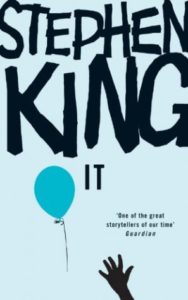
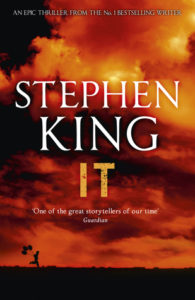
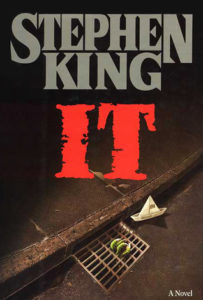
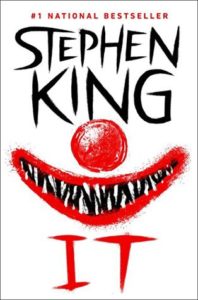
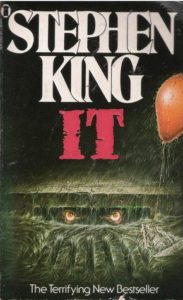
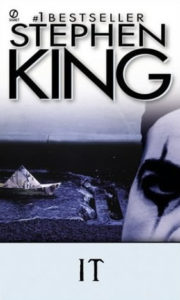
I agree with a “feeling” that I better understand after reading your analysis. I haven’t read IT but twice when I was 13 – 14years of age. At the time, I was sure King was a genius/author. I still think so though most of what he’s created hasn’t affected me so strongly as IT did. Some 42 years later I watched the movie and enjoyed the memories it evoked but knew it missed the mark. Thanks. I think I will enjoy a revisit even more now after perusing your thoughts.
Thanks so much for commenting. It’s nice to know I wasn’t alone in my reaction to the film. I’ll be interested to hear your thoughts if you decide to revisit the film 😊
With thanks! Valuable information!